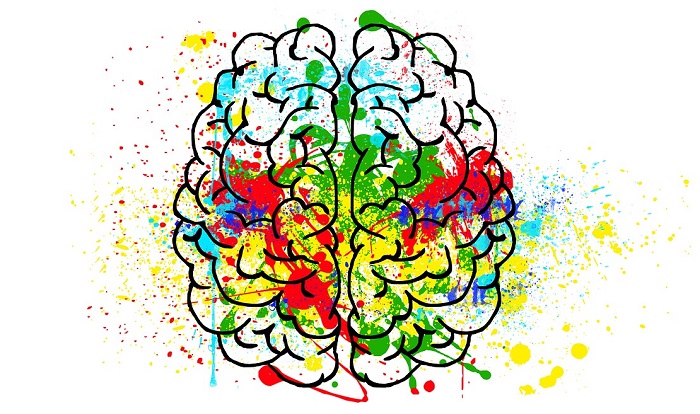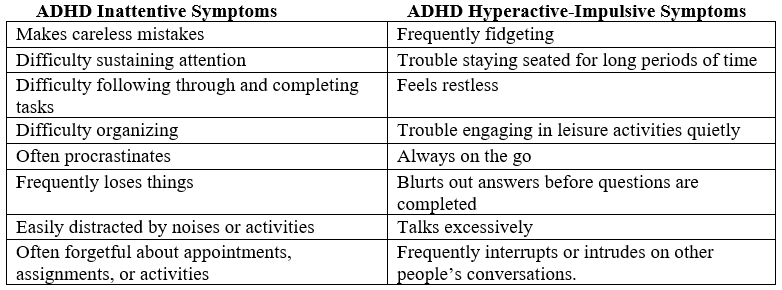- MN ABE Connect
- Archive
- Attention Deficit Hyperactivity Disorder
 January 14, 2022
January 14, 2022
Attention Deficit Hyperactivity Disorder
Wendy Sweeney, MA, Licensed Psychologist, PANDA Manager COVID-19 has caused distractions and worry for many people due to the uncertainties in our world. But is it Attention-Deficit-Hyperactivity Disorder (ADHD)? Many adults have trouble sitting still, getting distracted, paying attention, or being impulsive on occasion. It becomes troublesome when lack of concentration is consistently occurring and significantly impacting student learning.
COVID-19 has caused distractions and worry for many people due to the uncertainties in our world. But is it Attention-Deficit-Hyperactivity Disorder (ADHD)? Many adults have trouble sitting still, getting distracted, paying attention, or being impulsive on occasion. It becomes troublesome when lack of concentration is consistently occurring and significantly impacting student learning.
There are several possible reasons for concentration issues including anxiety, depression, brain injury, specific learning disorder, COVID-19, or Attention Deficit Hyperactivity Disorder (ADHD). It is important to determine the root of distractibility before diagnosing an individual with ADHD. ADHD is a lifelong condition; it does not just suddenly arise. There are three types of ADHD: inattentive, hyperactive-impulsive, or a combination of both.

If you have a student who is showing some of the above symptoms, consider the following strategies to improve focus.
- Provide a consistent routine and write the schedule on the board. Doing the same activities each day will help the student know what is expected and help them focus.
- When in-person, ask the student to sit at the front of the classroom to reduce distractions from other students.
 Give the student a stress ball or fidget toy to fiddle with. This can help some people with focus.
Give the student a stress ball or fidget toy to fiddle with. This can help some people with focus.- When doing tasks, some students benefit from listening to music (use headphones), others prefer complete quiet (provide earplugs).
- Students with ADHD respond and learn better when there are interactive activities. Provide these as much as possible.
- Use visual aids and hands-on materials, which helps with focus and uses another part of the brain.
- Break assignments into small manageable pieces, two at most.
- Give timelines and specific steps to help students complete assignments and projects.
- Provide all instructions in writing.
- Allow alternative ways to assess student’s skills, such as oral tests, projects, or other creative ways of demonstrating knowledge of a subject.
- Allow short scheduled breaks or brain breaks. This helps the student rejuvenate and refocus.
- Allow testing in a private area to reduce distractions.
- If the student continues to struggle with distractibility, consider referring them to either their primary doctor or a professional who can administer testing to evaluate for ADHD. There are medications which can be helpful for those who are diagnosed with ADHD.
More information
For more ADHD strategies and resources, visit the Attention Deficit Hyperactivity Disorder (ADHD) section on PANDA’s website (pandamn.org).
Newsletter Signup
Get MN ABE Connect—the official source for ABE events, activities, and resources!
Sign UpArticle Categories
- ABE Foundations/Staff Onboarding
- ACES/Transitions
- Adult Career Pathways
- Assessment
- CCR Standards
- Citizenship
- COVID-19
- Cultural Competency
- Digital Literacy/Northstar
- Disabilities
- Distance Learning/Education
- ELA
- Equity/Inclusion
- ESL
- HSE/Adult Diploma
- Listening
- Math/Numeracy
- Mental Health
- Minnesota ABE
- One-Room Schoolhouse/Multilevel
- Professional Development
- Program Management
- Reading
- Remote Instruction
- Science
- Social Studies
- Speaking/Conversation
- Support Services
- Teaching Strategies
- Technology
- Uncategorized
- Volunteers/Tutors
- Writing